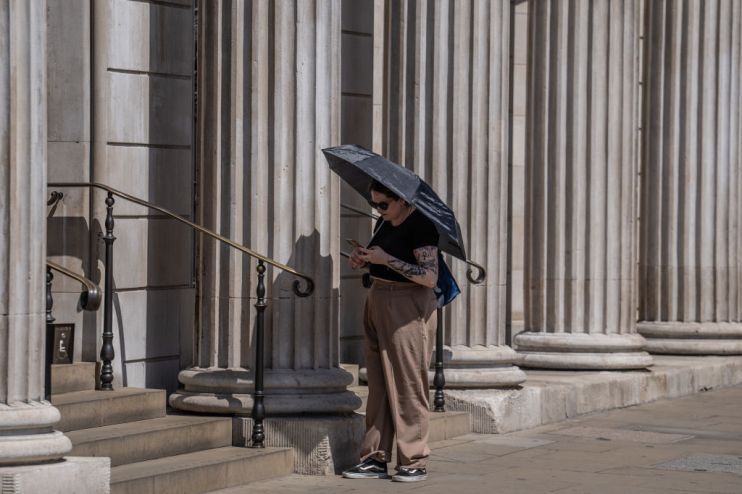Steaming inflation cuts Brits’ spending power at fastest pace on record

Rising living costs are eroding UK households’ spending power at the fastest pace since records began, revealed official figures published today.
Regular pay adjusted for inflation dropped to minus 2.8 per cent, the quickest fall since 2001, according to the Office for National Statistics (ONS).
The figures underscore the severe pressure the cost of living crunch is putting on Brits’ finances. Even including bonuses, real pay fell 0.9 per cent.
Swelling City bonuses led financial services to notch a 8.2 per cent rise in total pay, the biggest increase of any sector, the ONS said.
Inflation has surged to a 40-year high of 9.1 per cent, driven by ongoing Covid-19-related supply and demand imbalances and Russia’s invasion of Ukraine sending energy prices higher.
Fresh inflation figures published tomorrow by the ONS are expected to nudge higher, while the Bank of England thinks the cost of living will remain elevated through the summer and peak at over 11 per cent in October, more than five times its two per cent target.
Analysts have warned the UK may tip into recession if consumers respond to the inflation surge by scaling back spending and businesses are forced to slash production to offset rising costs.
The Bank has rarely had to balance taming inflation with interest rate hikes and a stalling economy.
Raising borrowing costs rapidly could engineer a recession by cooling spending and investment. Governor Andrew Bailey and co have lifted rates at each of their last five meetings to a 13-year high of 1.25 per cent. They are still low by historical standards.
Former rate setters have accused the Bank of being too slow to raise rates earlier to cushion the inflation jump. The Bank has said monetary policy is unable to deal with rising prices caused by international shocks, such as the war in Ukraine.
Nominal regular pay growth in the three months to May bumped higher to 4.3 per cent from 4.2 per cent.
Tony Wilson, director of the Institute for Employment Studies, said that rate of growth is “likely unsustainable and inflationary,” raising the likelihood of Threadneedle Street raising rates by a larger 50 basis points to tame price rises.
Ruth Gregory, senior UK economist at Capital Economics, said “wage growth [is] likely to stay above the rates of 3-3.5 per cent that are consistent with the two per cent inflation target, this supports our view that rates will rise further than widely expected, to a peak of three per cent”.
“August’s meeting remains a tough call, but the fact that markets are fully pricing a 50 basis point hike… suggests to us that the [Bank] is likely to follow through with a more aggressive rate increase,” James Smith, developed market economist at ING, said.
Firms are hiking wages for existing staff and raising starting pay to lure talent amid an extremely tight labour market.
The unemployment rate edged down to 3.8 per cent, while the vacancy to jobless ratio stayed at one, illustrating demand for workers remains strong despite the darkening economic outlook.
Chancellor Nadhim Zahawi siad today’s figures “underline how strong our jobs market continues to be”.
Britain is in a rare situation of having low unemployment despite hurtling toward a recession.